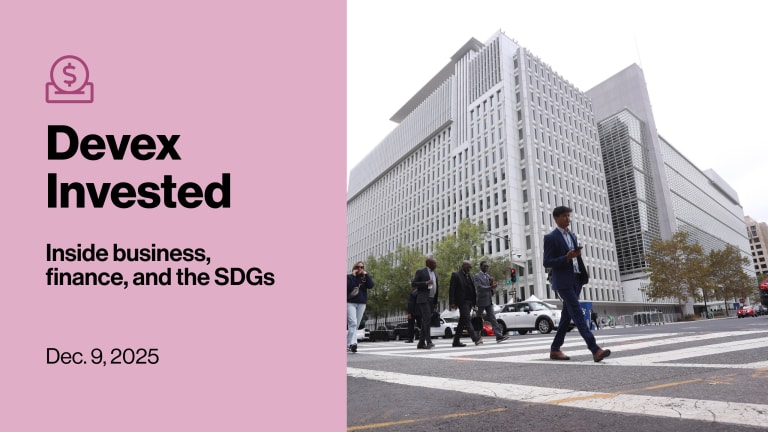
The World Bank can do more to help countries deal with the effects of climate change, such as extending a fund for low-income nations to also assist those classified as lower-middle-income, said Mahmoud Mohieldin, a former senior vice president at the bank.
The suggestion is sure to be seen as controversial, as the fund — known as the International Development Association — is reserved for the world’s lowest-income countries. Through IDA they are eligible for concessional financing in the form of lower-cost or no-cost loans and grants compared to higher-income nations. Mohieldin, who spoke Thursday at a Devex event in New York alongside the United Nations General Assembly, serves as the U.N. climate change high-level champion for Egypt.
“This could be a bit aggressive for some people who are familiar with the World Bank. I hope to see IDA terms extended to lower-middle-income countries,” Mohieldin said, adding that IDA is one of the World Bank’s most flexible funding mechanisms.
Expanding IDA eligibility would mean the fund’s dollars could be extended to roughly half the African nations now categorized as lower-middle-income — including Egypt, which is hosting the 27th U.N. Climate Change Conference, or COP 27, in November. That means dozens more countries that are home to millions of people could benefit.
“The technical solutions are there. I would say let’s see the new replenishment of IDA to be much more supportive, more generous with its mechanism.”
— Mahmoud Mohieldin, former senior vice president, World BankStill, expanding IDA would entail a greater number of countries vying for the roughly $93 billion in concessional resources available for the current funding cycle. The previous capitalization round was depleted in two years, rather than the usual three, because nations needed more financing to address the COVID-19 pandemic and its knock-on effects.
Expanding IDA is not without precedent, according to Mohieldin. He pointed to how the World Bank supported Lebanon and Jordan, both LMICs, as they dealt with an influx of Syrian refugees in the 2010s and did the same in response to the crisis in Venezuela.
“The technical solutions are there. I would say let’s see the new replenishment of IDA to be much more supportive, more generous with its mechanism,” he said.
Mohieldin declined to comment on World Bank President David Malpass’ recent remarks on climate change that have led to calls for his replacement but said that the World Bank is doing a lot to support climate finance.
“I would expect the leadership of the institution that I had the honor of working for for almost 10 years to do more and we’re expecting from them strong support, especially for low-income countries and middle-income countries,” he said.
Mohieldin indicated that all were welcome at the COP 27 in Sharm el-Sheikh, but added: “You will be even more welcome if you are coming not just with pledges and promises, [but] you are coming with finance, investments, and projects.”
“This is what’s being expected from a COP on climate that from the very beginning, from day one, was focusing only on one thing — implementation, implementation, implementation,” he said.
More funding is needed, and not just hitting the $100 billion in annual climate finance wealthy countries promised to low-income countries, but beyond, he said. This includes finding ways to mobilize more private finance, particularly in areas such as adaptation.
Climate mitigation efforts are progressing, but more scale and opportunities to bring in the private sector are needed, he said. Efforts to compensate lower-income countries for loss and damage — which is expected to be a major discussion point at COP 27 — are a “sad, pathetic case” where there is a lack of commitment from high-income nations even as countries such as Pakistan suffer the acute impacts of climate change, he said.









